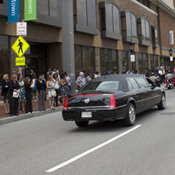Alumni Profile: The Barrister of Beer: Mark R. Fesche, J.D. ’02
Category: WebExtras

Photography: Jonathan Fredin
If you haven't gotten your fill of beer expert Mark Fesche, J.D. ’02, we have some more great-tasting Q-and-A gems on tap:
So what does the Maryland native think of North Carolina crabs?
“I don’t order them. I don’t get them. They don’t cook them right. Crab cakes are always disappointing.” Whenever he visits Maryland, he tries to get his crab fix. One of his favorite places to go is Corner Stable in Cockeysville.
What does a craft brewer pair with steamed crabs?
Fesche opts for a pilsner or other light German beer. It’s a strategic choice: A lighter beer doesn’t overwhelm the crab flavor and, more importantly, light beers don’t fill you up, leaving more room for crabs.
When he was attending UB, did he have a favorite hangout?
Like many others at UB, Fesche loved (and still does) Brewer’s Art on North Charles Street. “I like everything about the place,” he says, noting the one missing element is being able to see the brewer work. While living in Baltimore, he also spent a lot of time in Federal Hill bartending at Mother’s and could be seen around town bartending for Charm City Hospitality at places like Pier 6.
What plans does Fesche have for Huske Hardware House?
Now that he has created new beer recipes based on the previous styles offered by Huske, Fesche can focus on expanding their distribution. Currently, they distribute kegs and they sell growlers, but they are looking toward bottling their brews, which will require a production facility. Fesche is comfortable with this type of expansion because when he was at Deschutes Brewery in Oregon, they took a similar path, adding something new to the business every year. Fesche suspects bottling of Huske beers is about 18 months away.
What’s the deal with successful local beers that aren’t shipped very far?
Fesche explains that craft brewing generally starts with an unpasteurized product. Pasteurization is one option for maintaining a beer’s freshness, but the process eliminates some of the flavor. So a successful craft brewery must make a compromise: Either maintain your flavor but don’t distribute your beers as distantly, or lose some of the flavor for the benefit of wider distribution.
Will craft beer be as widely distributed as the larger names like Budweiser?
Here, Fesche acknowledges Pennsylvania’s Victory Brewing Company as a craft brewer with a great business model. They’ve accomplished widespread distribution and yet maintained the quality of their brews. Still, he says, “No little brewpub will become the king of beers.”
What’s this barrister of beer’s ruling when a patron chooses a mass-produced beer over a microbrew?
“I don't judge,” he says, adding that the weeknight crowd at Huske Hardware stays away from the big brand names like Budweiser and Miller. But during the weekend, when the vibe shifts somewhat toward “dance club,” some customers choose those over the house brews.

Mark Fesche, J.D. ’02
Photography: Jonathan Fredin
Mark Fesche, J.D. ’02
Photography: Jonathan Fredin

Mark Fesche, J.D. ’02
Photography: Jonathan Fredin
Mark Fesche, J.D. ’02
Photography: Jonathan Fredin

Mark Fesche, J.D. ’02
Photography: Jonathan Fredin
Mark Fesche, J.D. ’02
Photography: Jonathan Fredin





